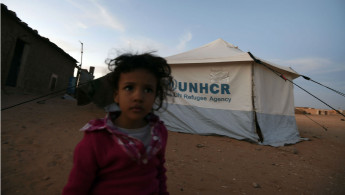Trump victory sparks optimism in Western Sahara
Throughout the US presidential election campaign, neither candidate mentioned the Western Sahara.
However, Hillary Clinton's close relations with Morocco prompted great scepticism around how the US might determine its approach to the Western Sahara conflict. Now, Donald Trump's win has created a sense of optimism among Sahrawis, as they hope for an imminent solution to the decades-old impasse.
As Trump begins his first term as the 45th president of the United States, the Western Sahara issue is not likely to be a priority for the business mogul - though the new administration will have to define its position at some point.
The situation remains unresolved in the Western Sahara, with military and political tensions reaching an unprecedented peace-time peak with the visit of then-UN Secretary-General Ban Ki-moon to the Sahrawi refugee camps in March 2016.
The change of administration in the US has led the Polisario Front - the armed Sahrawi movement - to formally congratulate Trump.
The group's new secretary general, Brahim Ghali, wrote:
"On behalf of the Sahrawi people, I write to extend to you my sincere congratulations upon your election as president of the United States of America. The electoral process was a triumph of democracy, and I am delighted both for you and for the people of the United States."
 |
Sahrawis have hope that the new administration will enforce the international legality in the Western Sahara by promoting a free and fair referendum on self-determination |  |
On the back of this open letter, Mouloud Said, the Polisario's representative in Washington DC, also expressed his optimism:
"Sahrawis have hope that the new administration will enforce the international legality in the Western Sahara by promoting a free and fair referendum on self-determination."
The Polisario Front has been fighting with Morroco over Western Sahara since 1975, when Spain withdrew from the region. In 1991, Morocco and Polisario signed a ceasefire agreement and paved the way for a UN-led referendum to take place. The referendum process, which could potentially decide the region's autonomy, independence, statehood - or lack thereof - has stalled ever since, as Morocco rejects any option that includes greater independence.
Dadah Mohamed was born in the Tindouf refugee camps in southwestern Algeria, after his parents fled there in the mid-1970s during the 16-year war. The young student is also feeling optimistic about the new American administration.
"I think he at least won't position himself on the Moroccan side - contrary to Clinton, who was well-known for being pro-Moroccan when she was secretary of state," said Dadah.
This optimism, perhaps unfounded, is based on the idea that US foreign policy is going to suddenly change towards Morocco.
 |
[Trump] has too many issues to care about like Syria and Yemen. He also has not shown any interest in North Africa. |  |
Sidahmed Fadal, however, anticipates very little interest from Trump's government.
"I don't think Trump will add anything new to the Sahrawi cause," he says. "First, because he has no prior military or government service. Second, he has too many issues to care about like Syria and Yemen. He also has not shown any interest in North Africa."
Sidahmed lives in the Auserd Sahrawi refugee camp. He maintained a cautious tone. "I think that Trump is a non-interventionist, though he could help [Sahrawis] if he puts pressure on France to stop using its veto for Morocco at the UN Security Council."
Morocco has enjoyed French support throughout the past four decades, lending vital support at the UN Security Council, in order to maintain a strong influence in North Africa.
Perhaps the best weathervane of US intentions towards Morocco is the anticipated influence - or otherwise - of John Bolton, the former US diplomat who was at one time expected to be nominated for a high-level position in the Trump administration. The former US ambassador to the UN has been one of the most vocal American politicians on enforcing a referendum in the Western Sahara.
"The [Security] Council will once again vote to prolong it by a few months and will thus continue to postpone a final resolution on the issue, unable to agree on a final plan and unwilling to force Morocco to abide by its international obligations to allow a referendum," Bolton told Congress in 2005.
As things stand, Bolton has no role within the new administration, and his influence is limited to the occasional appearance on Fox News.
Speculation will therefore continue over whether the US will break with tradition and push for a referendum. Though blessed with optimism, the people of the Western Sahara are not holding their breath.
Follow him on Twitter: @habibullahWS





 Follow the Middle East's top stories in English at The New Arab on Google News
Follow the Middle East's top stories in English at The New Arab on Google News


